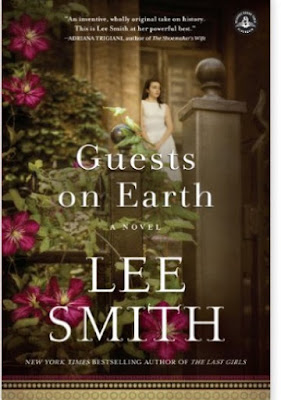I really enjoyed Lee Smith's book: Guests On Earth.
I will post one of the professional reviews below as I am always fascinated by the fact that sometimes I come away from a book thinking: "did the reviewer read the same book that I read?"
I am also hoping that I will be able to add the list of research that Lee did in order to write this book. It is amazing! I am so used to seeing the footnotes at the end of a genealogical article or historical article....it is refreshing to see the list of misc information consulted in a casual and easy to read form. I suppose that if I were planning on doing my own research, it would be nice to have it more formal. But for a novel, it is nice that it is easy and pleasant to read.
So many surprises in this book that I am not going to say much more as almost everything that I might say would ruin one of those surprises. I do have one question: "why did Evalina not go looking for Pan?" or perhaps she did....
Abandoned as a child upon her mother’s death in New Orleans in the 1930s, Evalina is sent to Highland Hospital in Asheville, North Carolina, by her mother’s wealthy lover—a convenient way of dealing with an inconvenient problem. Evalina may be a lot of things—a budding musician, a romantic dreamer—but mentally ill she is not. Yet over time, the mental hospital becomes her home and its staff and fellow patients her family. Celebrated for its unorthodox treatment methods, Highland attracts the penniless and the notorious, and Evalina is influenced by a nearly feral young man and the hospital’s most famous patient, Zelda Fitzgerald. Equally creative, emotive, independent, and adventurous as Zelda, wife of the renowned author F. Scott, Evalina also contradicts society’s standard for female behavior, guaranteeing that no matter how often she escapes or improves, she will always return to Highland. Riding the recurring wave of Zelda-mania, perennially best-selling Smith (Mrs. Darcy and the Blue-Eyed Stranger, 2010) presents an impeccably researched historical novel that reveals the early twentieth century’s antediluvian attitudes toward mental health and women’s independence. --Carol Haggas
Adding the research list is not as easy as I had hoped. I'll try it again another day. I read this book via Kobo on my phone.

No comments:
Post a Comment